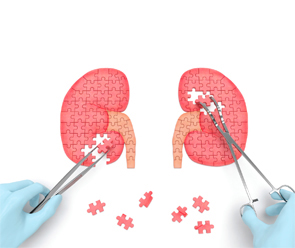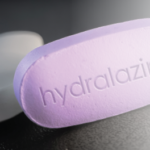
Aksabir/shutterstock.com
Rheumatoid arthritis (RA) is rarely associated with renal manifestations, but secondary amyloidosis due to chronic inflammation is reported to be the etiology of renal dysfunction in many cases of RA.1,2
The discovery of biologic therapy, with TNF-alpha inhibitors in particular, made a huge difference in the disease course and prognosis of RA patients. However, TNF-alpha inhibitor use is linked with paradoxical development of systemic or organ-specific autoimmune processes (e.g., lupus, vasculitis, interstitial lung disease, multiple sclerosis, autoimmune hepatitis, inflammatory myopathies, peripheral neuropathies).3,4
Autoimmune glomerulonephritis is rarely described in the literature, but when it is, it’s mostly in close temporal relation with the use of TNF-alpha inhibitors.5 It’s not known if the autoimmune process induced by the exposure continues after discontinuation of these drugs and is responsible for further damage in the following years.
Here, we present a case of long-standing, poorly controlled RA in a patient previously exposed to multiple TNF-alpha inhibitors who developed immune-mediated membrano-proliferative glomerulonephritis (MPGN).
Case Presentation
A 69-year-old African American female with 25 years’ history of seropositive, erosive RA presented to the hospital with complaints of abdominal discomfort, bloating, constipation and loss of appetite. In the year prior to this admission, pain and swelling in her hands, wrists, elbows and ankles were accompanied by two hours of morning stiffness. Physical examination revealed an ill-appearing woman in moderate discomfort, without rashes, but with bilateral metacarpophalangeal (MCP) and proximal interphalangeal (PIP) synovitis, swan neck deformities, bilateral ulnar deviation and mild knee effusions and hammertoes. In addition, rheumatoid nodules over her second and third right PIPs and left elbow were noted. Two-plus pedal edema was present up to knee level.
Renal dysfunction pathophysiology in RA patients is frequently linked to secondary amyloidosis due to long-lasting chronic inflammation. Rarely, the etiology of renal involvement is reported to be secondary to renal vasculitis or an autoimmune process.
Review of her medical chart revealed that, over the years, the patient had failed multiple disease-modifying anti-rheumatic drugs (DMARDs), such as hydroxychloroquine, methotrexate and leflunomide, and several biologic medications, including infliximab, etanercept and adalimumab. The last time she had received biologic treatment was approximately one year prior to this admission.
At the time of hospitalization, the patient was treated with 10 mg of prednisone daily. For hypertension, the patient was receiving 100 mg hydralazine three times per day.
A laboratory workup revealed that the patient was anemic (Hb 9.7 g/dL; normal range 12–14 g/dL) and leukopenic (WBC 3.7 10*3/uL; normal range 3.9–10.8 10*3/uL), and markers of inflammation (CRP 20 mg/dL; normal range <10 mg/dL; ESR 71 mm/hr; normal range <20 mm/hr) were significantly elevated.

